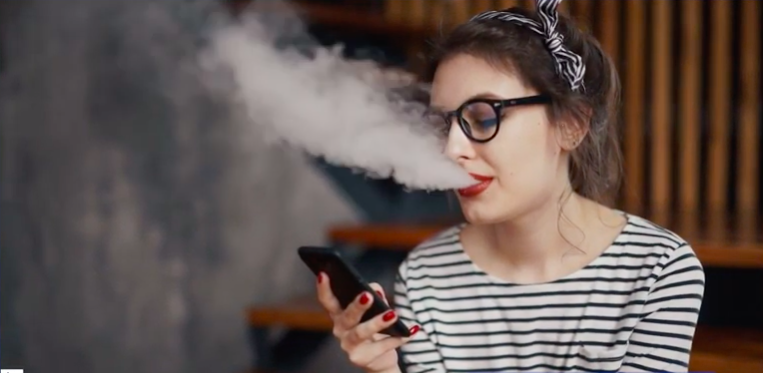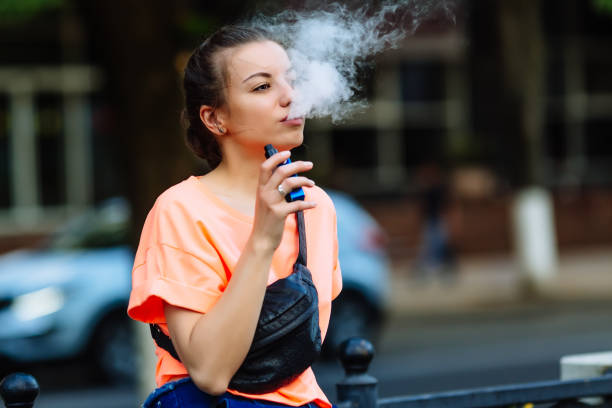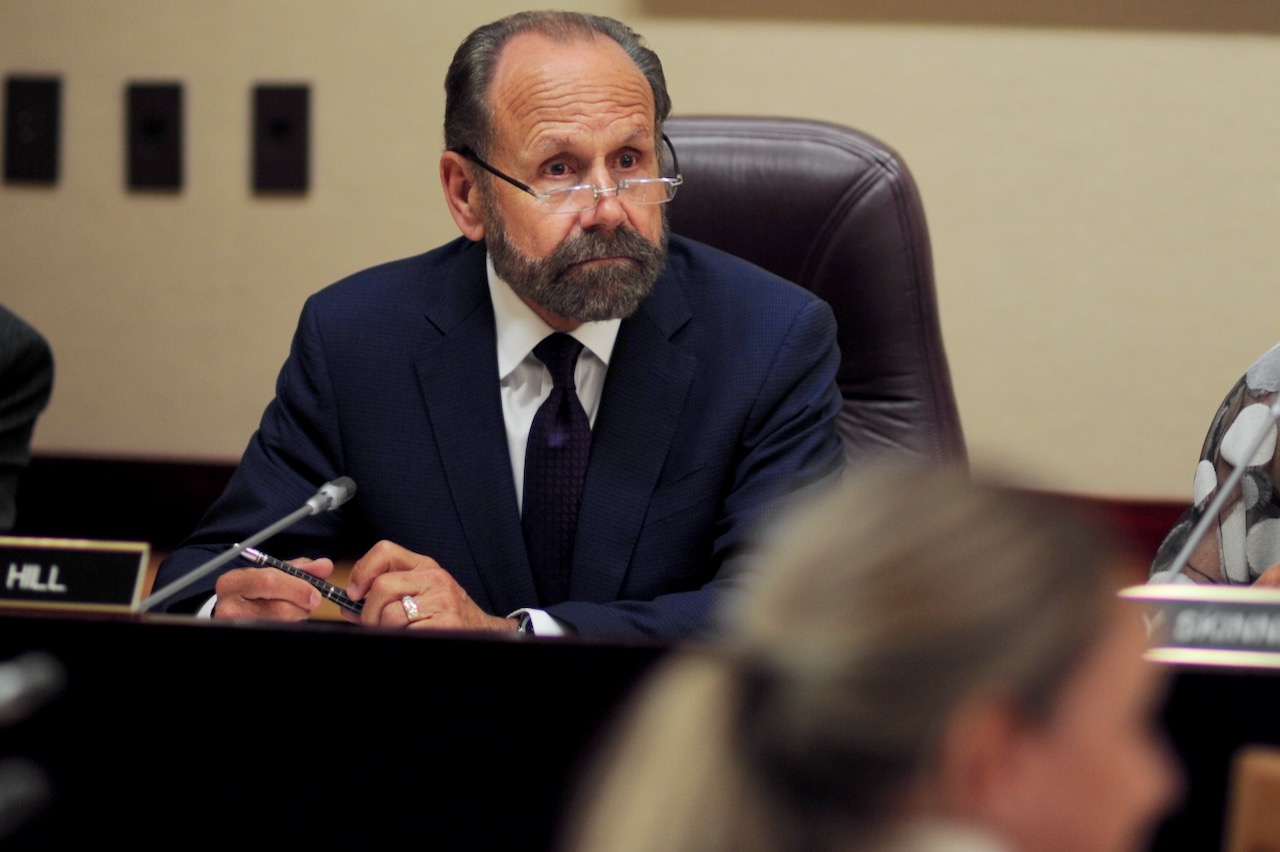
Vaping. (Photo: youtube screen capture)
Los Angeles Flavored Tobacco Ban Could Increase Youth Smoking
The bulk of current evidence indicates substantially greater harms from smoking
By Thomas Briant, June 16, 2021 10:13 am
The Los Angeles City Council is currently weighing a proposal to impose a city-wide ban on all flavored tobacco products, ostensibly on the basis that prohibiting the sale of these products will make smoking and vaping less attractive to Los Angeles youth. Ironically, however, evidence shows that by taking this step, the City Council could achieve exactly the opposite result: Scientific research using California data in fact shows that a tobacco flavoring ban would likely increase the number of high school students who smoke.
That is the only conclusion to be drawn from a first of its kind study that analyzed the impact of San Francisco’s 2018 ban on the sale of all flavored tobacco products including menthol cigarettes, flavored cigars, flavored smokeless tobacco, and flavored electronic cigarettes/nicotine vapor products. The study, published last month by the Yale School of Public Health, was funded by the National Institutes of Health and the Food and Drug Administration’s Center for Tobacco Products, and its results are unmistakably clear: Sensible though flavoring bans may sound, they have a hugely counterproductive negative health impact.
The Yale School of Public Health study measured high school student smoking rates in the San Francisco School District, both before and after the ban was adopted, and then measured those rates against those of students in seven other metropolitan school districts where no flavoring ban exists. One such district was actually the LAUSD. The study concluded that:
“San Francisco’s ban on flavored tobacco product sales was associated with increased smoking among minor high school students relative to other school districts. While the policy applied to all tobacco products, its outcome was likely greater for youths who vaped than those who smoked due to higher rates of flavored tobacco use among those who vaped. This raises concerns that reducing access to flavored electronic nicotine delivery systems may motivate youths who would otherwise vape to substitute smoking.”
According to the data summarized in the study, the smoking rate for San Francisco high school students under the age of 18 increased from 4.7 percent in 2017, before the adoption of the city’s ordinance, to 6.2 percent in 2019, the year after the ordinance was passed. That is an astonishing 32 percent increase in underage youth cigarette smoking rates in just a two-year period. At the same time, the underage smoking rates in the seven other major school districts, including the LAUSD, continued to decline and averaged a historic low of 2.8 percent in 2019.
In a follow-up article published in the Yale News on May 25, 2021, the study’s author warns that “These findings suggest a need for caution. While neither smoking cigarettes nor vaping nicotine are safe per se, the bulk of current evidence indicates substantially greater harms from smoking, which is responsible for nearly one in five adult deaths annually. Even if it is well-intentioned, a law that increases youth smoking could pose a threat to public health.”
While the Los Angeles-based retail stores that are members of our national association go to great lengths to prevent the sale of tobacco and nicotine vaping products to underage youth, this empirical data should give the Los Angeles City Council pause before moving forward and ushering in a new era of prohibition. With the underage youth tobacco use rate in Los Angeles at historic lows, increasing youth smoking is a public health disaster that needs to be avoided.
In addition to the smoking rate data, the Yale study identified a correlation between the adoption of a local sales ban on flavored tobacco products and an increase in youth smoking. That is, the existence of a law banning flavored tobacco products itself appears to be a factor in the higher youth smoking rates. Teenagers want what they are told they cannot have and the San Francisco study demonstrates that youth will substitute one tobacco product for another.
The Los Angeles City Council needs to understand that passing the ordinance would not enhance public health because it will not prevent underage youth from obtaining access to tobacco products. Studies have shown that the vast majority of underage youth rely on older friends, siblings, parents, and even strangers to buy tobacco products for them. With youth being so resourceful in relying on non-retail sources for tobacco, a law taking all flavored tobacco products off of Los Angeles store shelves will be a health policy failure. Take it from San Francisco, and Yale: A flavoring ban will likely cause youth to switch to cigarettes rather than avoiding the use of tobacco products, and California kids would ultimately pay the price for bad policymaking by the Los Angeles City Council.
- Los Angeles Flavored Tobacco Ban Could Increase Youth Smoking - June 16, 2021





The story doesn’t quite make the article’s (non-) conclusion clear. San Francisco saw a small increase in youth smoking, which is more harmful than vaping. The article doesn’t make clear how much more smoking, nor how much vaping changed overall. This has mostly to do with limitations of the youth smoking database the author analyzed. For example, it doesn’t distinguish between students vaping tobacco products or cannabis products. Earlier studies show decreases in tobacco use by people in their 20’s, but also showed increased cigarette use. It could still be that the students overall risk went down because more of them stopped using tobacco entirely, even though some switched to cigarettes.
So the real bottom line is: Nobody really knows whether banning flavored tobacco promotes student health or not. Until more data is available, there’s no reason to be terribly concerned whether these products are banned or not. Unless, of course, you really like flavored vapes,…
Why not apply the same standards to foods as obesity is a much greater health hazard than vaping or flavored tobacco.
If health is the concern, wean kids off of sugar based products or stay out of behavior control.